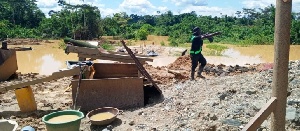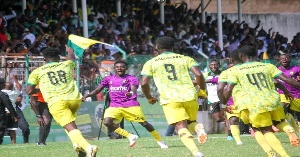- Home - News
- Elections 2024
- News Archive
- Crime & Punishment
- Politics
- Regional
- Editorial
- Health
- Ghanaians Abroad
- Tabloid
- Africa
- Religion
- Photo Archives
- Press Release
General News of Tuesday, 25 March 2025
Source: www.ghanawebbers.com
Special courts to fight galamsey in the offing
The government plans to establish special courts for illegal mining cases. This initiative aims to speed up prosecutions of individuals involved in galamsey.
The Ministry of Lands and Natural Resources is collaborating with the Minister of Justice and the judiciary. They are finalizing details for these specialized courts.
Minister Emmanuel Armah-Kofi Buah shared this information with the Daily Graphic. He emphasized that the government is committed to quick prosecutions for illegal miners.
This announcement follows calls from stakeholders in forestry and environmental activism. They urged for dedicated courts to handle violations of mining regulations swiftly.
Key figures making this request include Dr. Hugh Brown, Daryl Bosu, and Dr. Kenneth Ashigbey. They believe weak prosecution is a major issue in combating galamsey.
Setting up specialized courts would help address many outstanding environmental crime cases. It would ensure that offenders face justice quickly, deterring others from illegal activities.
According to Section 99 of the Minerals and Mining (Amendment) Act, 2019, illegal mining is a serious offense. Ghanaians caught can face fines between GH¢120,000 and GH¢180,000 or imprisonment from 15 to 25 years.
Foreigners involved in illegal mining face even harsher penalties. They could be fined between GH¢1.2 million and GH¢3.6 million or imprisoned for 20 to 25 years.
Despite numerous arrests over the years, few have been prosecuted successfully. Data shows that 845 people were arrested for illegal mining in forest reserves recently.
Of those arrested, only 20 have faced prosecution so far. Many cases remain pending while suspects are on bail or remand.
Dr. Ashigbey highlighted the need for a swift judicial response under a 24-hour economy policy. He called for courts that operate around the clock to address environmental crimes effectively.
He stressed that galamsey operators pose significant threats to forests and public safety. The judiciary must impose stricter penalties on illegal miners, especially foreigners.
Dr. Brown criticized the slow pace of prosecutions as alarming and ineffective deterrence against illegal mining activities. He noted that high-profile arrests have not led to timely legal action.
He expressed frustration over ongoing investigations delaying court appearances for many suspects arrested last year and this year.
Dr. Brown also suggested enhancing prosecutors' understanding of environmental crimes' impacts on health and ecology through training programs.
Mr. Bosu echoed concerns about delayed prosecutions despite military operations arresting many individuals involved in illegal mining activities.
He emphasized the need for a consistent system ensuring smooth transitions throughout the prosecution process.











